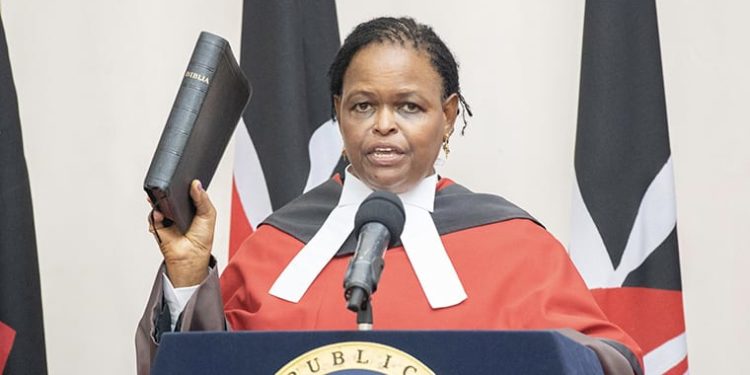A petition seeking the removal of Kenya’s Chief Justice Martha K. Koome has been submitted to the Judicial Service Commission (JSC), alleging incompetence and failure to uphold judicial standards.
The petition, filed by advocate Christopher Rosana on August 28, 2024, calls for the dismissal of Justice Koome based on her role in a controversial Supreme Court decision that allegedly violated constitutional and legal principles, leading to what the petitioner describes as a constitutional crisis.
The petition accuses Chief Justice Koome, who also serves as the President of the Supreme Court, of failing to provide competent leadership following a decision to terminate the right of audience for Senior Counsel Ahmednasir Abdullahi. On January 18, 2024, the Supreme Court issued a letter, referred to as “the Communication,” which banned Mr. Abdullahi and his law firm from representing clients before the Court. This action, according to the petitioner, has triggered multiple legal challenges and could lead to significant consequences for the administration of justice in Kenya.
Citing the Law Society of Kenya v The Supreme Court of Kenya and others (Petition E026 of 2024), the petition highlights a sequence of events following the Supreme Court’s decision. In a ruling dated June 28, 2024, Honorable Justice E.C. Mwita noted that on January 22, 2024, an associate from Mr. Abdullahi’s law firm was denied audience before the Deputy Registrar of the Supreme Court, reinforcing the Court’s decision to terminate the senior counsel’s right of audience. A similar scenario occurred the following day when the Supreme Court judges reiterated the ban.
The petitioner argues that, as the head of the judiciary, Chief Justice Koome bears ultimate responsibility for this decision and its fallout. The petition states, “The Chief Justice, who should have shown her competence by acting wisely, has demonstrated by the said Communication that she lacks the leadership required to lead the Judiciary.”
The petition outlines several grounds for Justice Koome’s removal, emphasizing what it describes as her failure to foresee the legal and constitutional ramifications of the Supreme Court’s decision. Among the allegations, the petition claims that Justice Koome, despite her 15 years of experience as a superior court judge, “could not foresee that implementing the decision embodied in the Communication could be challenged under the Fair Administrative Action Act, 2015.”
Furthermore, the petitioner contends that the Chief Justice failed to apply the fundamental legal principle that “no man can be a judge in his own case.” With the Supreme Court judges having been sued at the High Court in Petition E026 of 2024, the matter could ascend to the Court of Appeal and potentially back to the Supreme Court, creating a conflict of interest where the same judges might preside over a case in which they are parties.
The petition warns of a constitutional crisis and notes, “As the head of the Judiciary, she has successfully managed to place the High Court above the Supreme Court, turning the hierarchy on its head by her failure of foresight.” The petitioner further argues that this failure has caused embarrassment to the judiciary, where the High Court now appears to be supervising the Supreme Court.
Rosana claims that the Supreme Court’s decision sets a dangerous precedent by potentially undermining the right of audience for legal counsel. The petition states, “If the Supreme Court can deny audience to counsel without considering the potential consequences or the proper legal options available, then any advocate can be denied audience at any time for any reason.” This, it argues, threatens the principles of fair hearing and access to justice, which are cornerstones of Kenya’s legal system.
The petition also asserts that the Chief Justice’s actions could gradually erode judicial independence, quoting a warning from history: “Liberty is always lost gradually and then suddenly. Every little concession made to avoid an undesirable result will eventually make that result inevitable.”
Drawing comparisons with international judicial standards, the petition notes that justices of the Supreme Court of the United States have faced numerous attacks but have generally managed to avoid what the petitioner calls “an intellectual misstep” such as the one allegedly created by Chief Justice Koome. It also references several cases from American jurisprudence, such as *Craig v. Harney* (1947) and *Abrams v. United States* (1919), to illustrate how courts worldwide have navigated the complex interplay between legal authority, free speech, and public opinion without compromising their integrity.
The petition concludes with a call for the Judicial Service Commission to act decisively, stating that the Chief Justice’s lack of judgment has placed the Kenyan judiciary in a precarious position. Rosana urges the Commission to remove Chief Justice Koome from office, arguing that her continued tenure threatens the proper administration of justice and the rule of law in Kenya.
Rosana concludes his petition with a stark warning: “Every member of the Bar is justified to be worried that their right of audience can be terminated arbitrarily, without any sense of consequence,” underscoring the broader implications of the Supreme Court’s decision on the Kenyan legal landscape.












